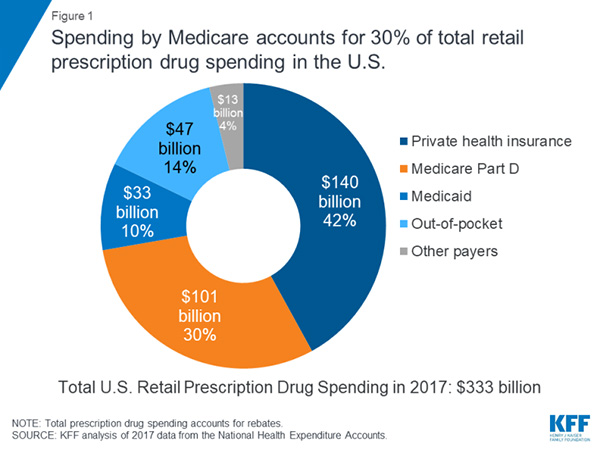From KFF, the Henry J. Kaiser Family Foundation —
The affordability of prescription drugs is a pressing concern for many Americans, with broad agreement across the political spectrum that lowering prescription drug costs should be a top priority for Congress. The Trump Administration, members of Congress, and several 2020 presidential candidates have offered proposals to lower drug prices. Many of these proposals would affect prescription drug spending under Medicare, which accounts for 30 percent of national retail spending on drugs and nearly $1 out of every $5 in total Medicare spending (Figure 1).
 Prescription drugs are an important component of health care for Medicare beneficiaries, which includes more than 60 million older adults and people with long-term disabilities. The majority of Medicare prescription drug spending is for drugs covered under Part D, the outpatient prescription drug benefit. Medicare Part B also covers drugs that are administered to patients in physician offices and other outpatient settings.
Prescription drugs are an important component of health care for Medicare beneficiaries, which includes more than 60 million older adults and people with long-term disabilities. The majority of Medicare prescription drug spending is for drugs covered under Part D, the outpatient prescription drug benefit. Medicare Part B also covers drugs that are administered to patients in physician offices and other outpatient settings.
This brief describes proposed and recent changes to control Medicare drug spending and lower beneficiaries’ out-of-pocket drug costs. We include proposals from the Trump Administration and legislation introduced during the 116th Congress, including legislation that recently passed out of the Senate Finance Committee. We review the implications of these changes for various stakeholders and explain their estimated effects on Medicare and beneficiary spending, to the extent such effects are known, based primarily on estimates from the Congressional Budget Office (CBO).
The brief focuses on drug pricing proposals related to Medicare specifically, rather than broader proposals that are not solely focused on Medicare, including those related to drug importation, generic drug availability, patents, and price transparency.1 While we have made every effort to include the most recent proposals pertaining to Medicare drug costs, policy discussions are evolving rapidly. This brief will be updated as necessary in the future.
Overview of Proposed and Recent Changes
PROPOSED CHANGES
- Allow the government to negotiate drug prices
- Modify the Medicare Part D benefit design
- Establish an out-of-pocket spending limit and reallocate liability for catastrophic costs
- Exclude manufacturer discounts from the calculation of “TrOOP”
- Cap increases in Medicare drug prices to the rate of inflation
- Require rebates for Part D drugs with price increases faster than inflation
- Establish an inflation limit on Part B drug reimbursement growth
- Use international reference pricing for drugs covered by Medicare
- Make other modifications to payments for drugs covered under Part B
- Modify rebates under Part D
- Eliminate rebates under Part D (withdrawn by the Administration in July 2019)
- Share rebates with Part D plan sponsors and/or beneficiaries
- Provide Medicaid rebates for drugs prescribed to low-income Part D beneficiaries
- Move coverage of some drugs from Part B to Part D
- Improve coverage for low-income Part D enrollees
- Eliminate cost sharing for generics for low-income subsidy enrollees
- Change eligibility requirements for low-income subsidies
RECENT CHANGES
- Allow Medicare Advantage plans to require step therapy for Part B drugs
- Modify coverage requirements for drugs in Part D protected classes
- Require Part D plan sponsors to use real-time benefit tools
